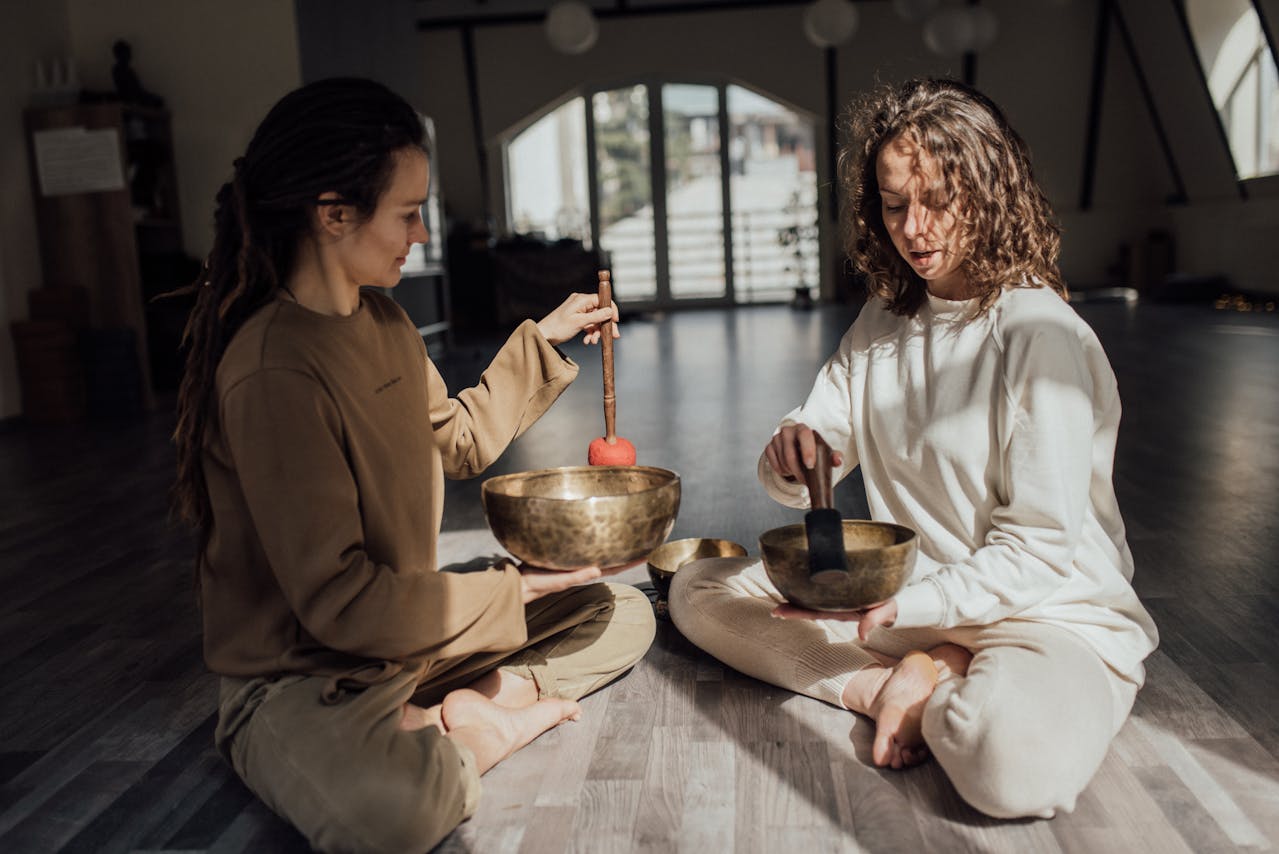
Table of Contents
Chakra balancing is the practice of bringing balance to the body's energy centers, and improving the body's seven chakra alignment.
Introducing Chakra Balancing
The human body has seven main chakras that are responsible for regulating different aspects of physical, emotional, and mental health. Each one is associated with a specific chakra color, location, and function. When they are in balance, they allow for the free flow of energy throughout the body.
Balancing chakras has numerous benefits, including improved physical health, increased emotional stability, and enhanced mental clarity. By ensuring that each chakra is balanced and functioning correctly, we can maintain optimal health and well-being.
Chakras are an integral part of various spiritual practices, including yoga, meditation, and Reiki. However, even those who do not follow any spiritual tradition can benefit from chakra balancing practices.
In this article, we will explore the basics of chakras and their functions, the importance of balancing the chakras, and various techniques to achieve chakra balance.
Balancing Explained
Chakra balancing is the process of restoring harmony and balance to the body's energy centers. It involves various techniques that aim to clear blockages or imbalances in the chakras, allowing energy to flow throughout the body.
By addressing any blockages or imbalances in these energy centers, one can enhance their overall well-being and sense of inner harmony.
Signs of Imbalanced Chakras
Imbalances in chakras can manifest in various ways, affecting our physical, emotional, and mental health. Here are some common signs of blocked chakras:
Root chakra (Muladhara)
- Physical symptoms: Fatigue, lower back pain, constipation, and other digestive issues
- Emotional signs: Anxiety, fear, lack of trust, and feeling disconnected from oneself
- Behavioral patterns: Hoarding, overeating, and being overly materialistic
Sacral chakra (Swadhisthana)
- Physical symptoms: Low libido, menstrual irregularities, urinary tract issues, and lower back pain
- Emotional signs: Mood swings, feeling emotionally unstable, and being unable to express emotions
- Behavioral patterns: Addictions, low creativity, and lack of pleasure in life
Solar Plexus chakra (Manipura)
- Physical symptoms: Digestive issues, poor metabolism, and low immunity
- Emotional signs: Low self-esteem, feelings of powerlessness, and difficulty setting boundaries
- Behavioral patterns: Perfectionism, workaholism, and control issues
Heart chakra (Anahata)
- Physical symptoms: Heart and lung issues, poor circulation, and high blood pressure
- Emotional signs: Feeling disconnected from others, difficulty trusting, and lack of empathy
- Behavioral patterns: Codependency, people-pleasing, and being overly critical of others
Throat chakra (Vishuddha)
- Physical symptoms: Sore throat, thyroid issues, and dental problems
- Emotional signs: Fear of speaking up, difficulty expressing oneself, and feeling unheard
- Behavioral patterns: Overuse of sarcasm, lying, and gossiping
Third Eye chakra (Ajna)
- Physical symptoms: Headaches, migraines, and other neurological issues
- Emotional signs: Difficulty making decisions, lack of intuition, and feeling stuck in life
- Behavioral patterns: Avoiding responsibility, feeling disconnected from spirituality, and being overly judgmental
Crown chakra (Sahasrara)
- Physical symptoms: Chronic exhaustion, sensitivity to light and sound, and poor sleep
- Emotional signs: Feeling disconnected from spirituality, lack of purpose, and difficulty understanding higher consciousness
- Behavioral patterns: Avoiding spiritual practices, feeling disconnected from oneself and others, and being overly attached to material possessions
It's important to note that experiencing these signs does not necessarily mean that a specific chakra is blocked or imbalanced.
However, if you're consistently experiencing multiple symptoms related to a particular chakra, it may be worth exploring ways to balance and heal it.
How Do You Rebalance And Heal Your Chakras?

Chakra rebalancing can be done in several ways to rebalance and heal your chakras, and the methods chosen will depend on personal preference and availability.
Here are some popular chakra healing techniques that can provide chakra treatment:
-
Yoga: Certain yoga poses can target specific chakras, such as the camel pose (Ustranasana) for the heart chakra, and the tree pose (Vrikshasana) for the root chakra.
-
Meditation: Focusing on each chakra while meditating can help to balance and energize them. There are also guided chakra meditations available online.
-
Sound Healing: Specific sounds and frequencies can be used to stimulate and balance each chakra. Singing bowls, tuning forks, and other instruments can be used in sound healing practices.
-
Reiki: Reiki is a form of energy healing that can be used to balance the chakras. A trained Reiki practitioner can channel healing energy to the individual, helping to remove blockages and restore balance.
-
Stones and Crystals: They can be used to clear and activate the energy of each chakra, allowing them to work more effectively. Chakra stones help to dissipate stagnated energy in the body, while restoring balance and harmony.
By placing them on or near the appropriate chakra area of the body, they help to open and align the energies within our bodies. Chakra stones are also beneficial in helping us deepen our meditation practice by providing support with calming and focusing energies.
It is important to note that chakra healing is a holistic approach and should be combined with self-care practices such as proper nutrition, exercise, and stress-reduction techniques.
By incorporating these practices into your daily routine, you can maintain a balanced flow of energy throughout your body and enhance your overall well-being.
When starting chakra balancing, it is recommended to focus on the lower chakras first. These include the root chakra, sacral chakra, and solar plexus chakra.
Note that each chakra affects the others. If one chakra is blocked, it can cause imbalances in the entire chakra system. By starting with the lower chakras, the energy flow can be established from the ground up, allowing for a more balanced and stable energy system.
Crystals and Essential Oils For Chakra Healing
Using crystals and essential oils are two powerful tools to promote healing and balance in the chakras.
Here are some examples:
- Root chakra crystals: Use red jasper or hematite crystals and essential oils like patchouli or cedar wood to ground and stabilize.
- Sacral chakra crystals: Use carnelian or tiger's eye crystals and essential oils like ylang-ylang or sandalwood to promote creativity and balance emotions.
- Solar Plexus chakra crystals: Use yellow jasper or citrine crystals and essential oils like lemon or ginger to boost personal power and confidence.
- Heart chakra crystals: Use green aventurine or rose quartz crystals and essential oils like rose or bergamot to cultivate love and compassion.
- Throat chakra crystals: Use lapis lazuli or aquamarine crystals and essential oils like peppermint or eucalyptus to stimulate self-expression and communication.
- Third Eye chakra crystals: Use purple fluorite or amethyst crystals and essential oils like lavender or frankincense to enhance intuition and visualization.
- Crown chakra crystals: Use selenite or clear quartz crystals and essential oils like lotus or jasmine to connect with spiritual energy and consciousness.
Chakras explained
There are seven main chakras in the body, representing an individual energy center in the physical body, starting at the base of the spine and ending at the top of the head.
Each chakra is connected to specific physical, emotional, and spiritual aspects of our being.
- Root chakra (Muladhara) - The first chakra is located at the base of the spine, associated with the color red, and connected to our sense of grounding and survival instincts.
- Sacral chakra (Svadhisthana) - The second chakra is located in the lower abdomen, associated with the color orange, and connected to our sexuality, creativity, and sense of pleasure.
- Solar Plexus chakra (Manipura) - The third chakra is located in the stomach area, associated with the color yellow, and connected to our personal power, self-esteem, and ability to withstand challenges.
- Heart chakra (Anahata) - The fourth chakra is located in the center of the chest, associated with the color green, and connected to our ability to love, give and receive compassion, and connect with others and their emotions.
- Throat chakra (Vishuddha) - The fifth chakra is located in the throat, associated with the color blue, and connected to our ability to communicate and express ourselves authentically.
- Third Eye chakra (Ajna) - The sixth chakra is located in the center of the forehead, associated with the color indigo, and connected to our intuition, inner wisdom, and spiritual insight.
- Crown chakra (Sahasrara) - The seventh chakra is located at the top of the head, associated with the color violet or white, and connected to our connection to the divine, universal consciousness, and spiritual awakening.
Conclusion
In conclusion, chakra balancing is an effective way to improve overall well-being by harmonizing the energy flow within the body's energy centers. With a deeper understanding of the seven chakras and their functions, you can identify blockages and rebalance them using a variety of techniques.
With dedication and persistence, anyone can achieve a balanced chakra system and improve their quality of life.
References
The Chakra System as a Bio-Socio-Psycho-Spiritual Model of Consciousness
A Chakra System Model of Lifespan Development
A Brief History of the Chakras in the Human Body
The Importance of Treating Energy Imbalances
The Chakra System and Psychotherapy
Disclaimer
The contents of this article are provided for informational purposes only and are not intended to substitute for professional medical advice, diagnosis, or treatment. It is always recommended to consult with a qualified healthcare provider before making any health-related changes or if you have any questions or concerns about your health. Anahana is not liable for any errors, omissions, or consequences that may occur from using the information provided.

By: Anahana
The Anahana team of researchers, writers, topic experts, and computer scientists come together worldwide to create educational and practical wellbeing articles, courses, and technology. Experienced professionals in mental and physical health, meditation, yoga, pilates, and many other fields collaborate to make complex topics easy to understand.
